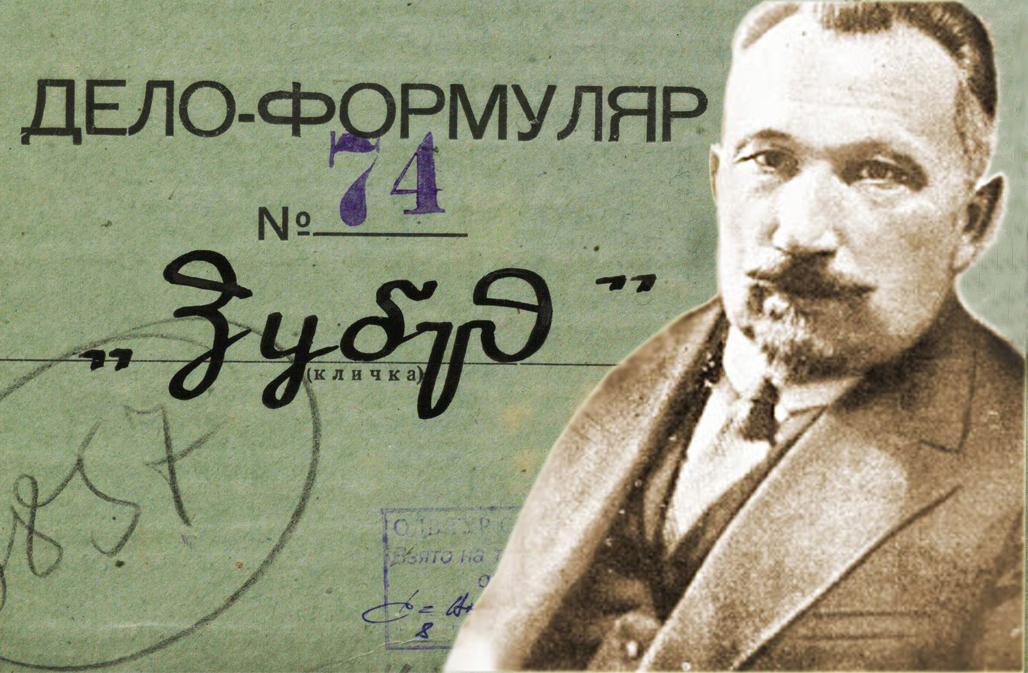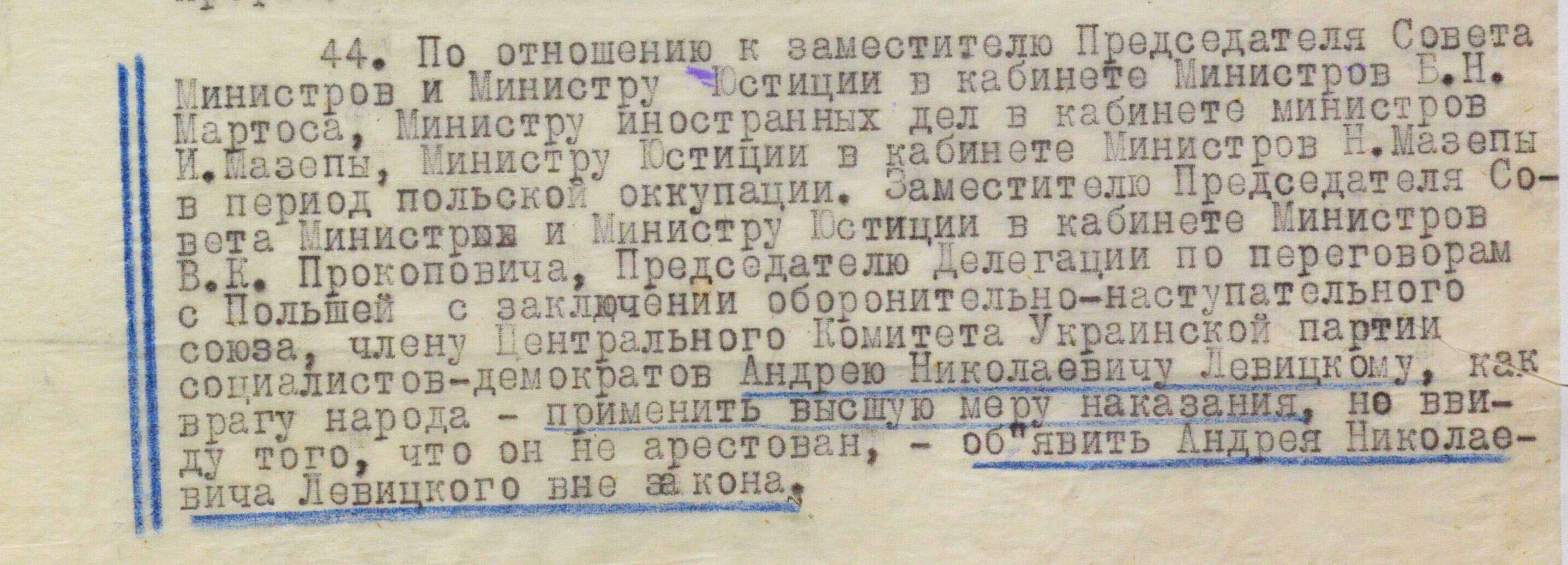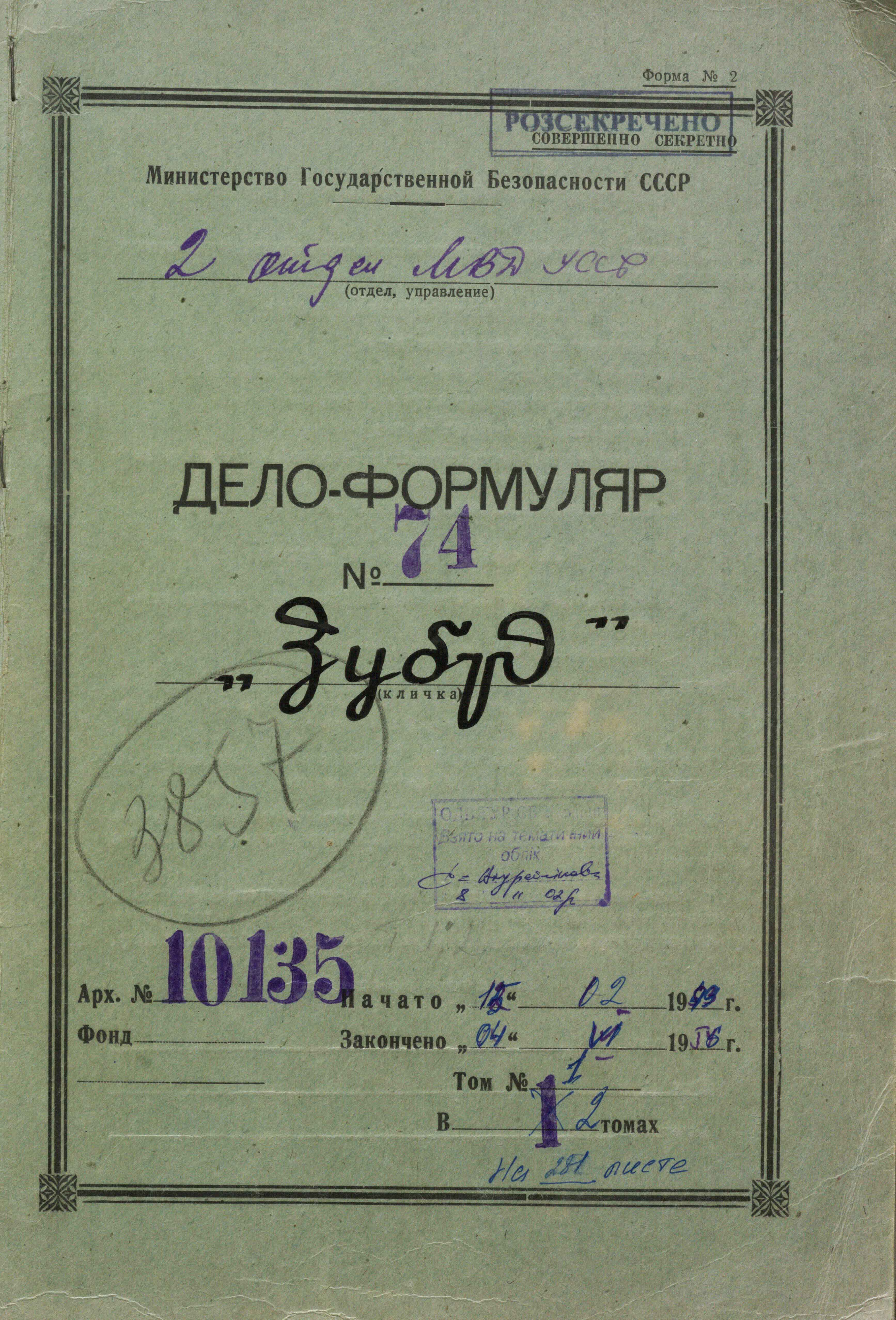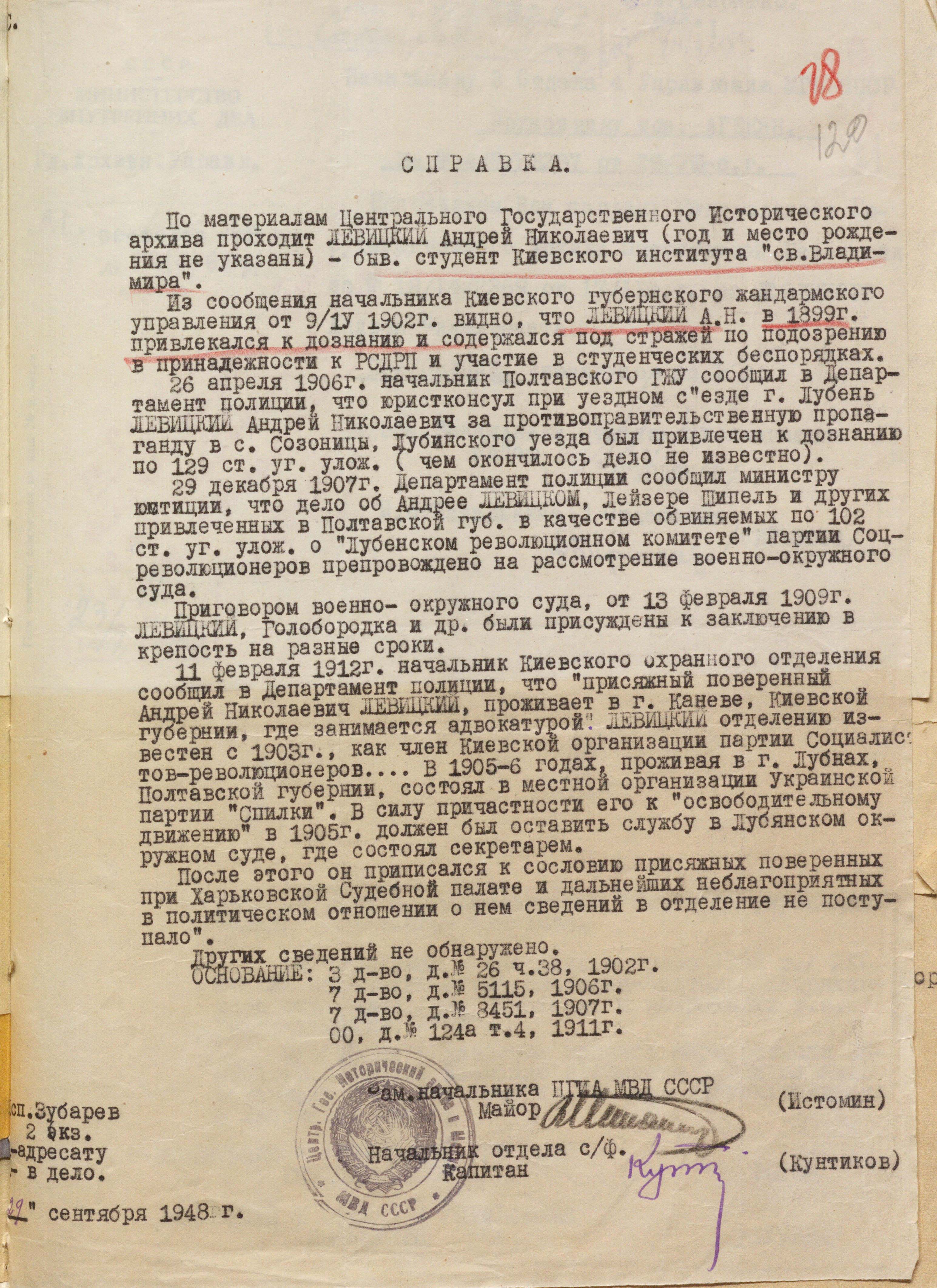President of the Ukrainian People's Republic Andriy Livytskyi. The “Zubr” Target of Recruitment Cultivation by MGB of the Ukrainian SSR
8/11/2021

Andriy Livytskyi is repeatedly mentioned in the Intelligence’s archival documents, because he was a key figure both during the proclamation of Ukraine's independence and its defense in 1917–1920, and during the struggle for the interests of Ukrainians in exile. At one time, on the occasion of the Day of Unity of Ukraine, the Foreign Intelligence Service of Ukraine published an article about the epistolary legacy of the long-term President of the Ukrainian People's Republic in exile. We are publishing new documents from the “Zubr” case which may add to Livytsky's eventful biography, and prove once again that he was an outstanding figure in the cause of Ukrainian statehood.
In different periods of Ukrainian history of the 20th century, Livytskyi Andriy Mykolayovych held a number of high positions in the UPR’s government – such as a member of the Ukrainian Central Rada, Minister of Justice and Minister of Foreign Affairs, Deputy Head of the Council of People's Ministers, head of the UPR’s diplomatic mission in Poland. He was also one of the organizers and leaders of the Labor Congress of Ukraine, which in January 1919 approved the historical documents - the Directory of the UPR’s Universal on the unification of the UPR and WUPR. Even more important was his role in the Ukrainian liberation movement in the interwar period. At that time, he was the Prime Minister of the UPR’s Government, the Head of the UPR’s Directory and the Otaman-in-Chief of the UPR’s troops after Symon Petliura’s death, the President of the UPR in exile.
 Not surprisingly, A. Livytskyi's activities were closely monitored by the VUChK-GPU-NKVD-MGB of the USSR. Despite the change of the names, all those Soviet state security agencies consistently and persistently had been hunting for him since the times of the All-Ukrainian Extraordinary Commission.
Not surprisingly, A. Livytskyi's activities were closely monitored by the VUChK-GPU-NKVD-MGB of the USSR. Despite the change of the names, all those Soviet state security agencies consistently and persistently had been hunting for him since the times of the All-Ukrainian Extraordinary Commission.
The archives contain a report prepared by the Chief of the Secret Operations Unit of the Special Department at the Central Directorate of Extraordinary Commissions of Ukraine Semen Dukelskyi on accusing of members of the Government of the Ukrainian People's Republic and Ukrainian political parties of anti-Soviet counterrevolutionary activities.
Having named all possible and impossible sins of the Government of the Ukrainian People's Republic, which allegedly “prolonged the civil war and delayed the triumph of the socialist revolution all over the world” and which “is preparing new adventures and interventions from abroad for the march and conquest of Ukraine and Russia, in order to drown in blood of peasants and workers the cause of liberating workers and peasants from the oppression of world imperialism and world capitalism”, the career Chekist expressed proposals for the punishment of the leaders of the Ukrainian government.
In particular, with regard to A. Livytsky, the verdict reads as follows: “As for the Deputy Head of the Council of Ministers and the Minister of Justice in the Cabinet of Ministers B. N. Martos, Minister of Foreign Affairs in the Cabinet of Ministers I. P. Mazepa during the Polish occupation, Deputy Chairman of the Council of Ministers and the Minister of Justice in the Cabinet of Ministers V. K. Prokopovych, the head of the delegation for negotiations with Poland on the conclusion of a defense-offensive alliance, a member of the Central Committee of the Ukrainian Party of Socialist Democrats Andriy Mykolayovych Livyskyi, as an enemy of the people, to apply capital punishment, but taking into account the fact that he is not arrested, - to declare Andriy Mykolayovych Livyskyi to be an outlaw” (BSA of the SZR of Ukraine. - F. 1. – Case 10135.– Vol.2. – P. 22).
 This document is dated January 20, 1921. At that time, the Army of the Ukrainian People's Republic, under pressure from Bolshevik troops, was forced to leave Ukraine and move to Poland and Romania. And repressions began against the participants of the national liberation struggle.
This document is dated January 20, 1921. At that time, the Army of the Ukrainian People's Republic, under pressure from Bolshevik troops, was forced to leave Ukraine and move to Poland and Romania. And repressions began against the participants of the national liberation struggle.
The document, along with the traditional accusations of counter-revolutionary activities, cites certain materials of the UPR era, which are now important for understanding the actions and attitudes of the figures of that time.
For example, here we can find the text of Head of the Directory of the Ukrainian People's Republic Symon Petliura’s gratitude ( dated May 21, 1920) to the head of the diplomatic mission in Poland Andriy Livytskyi. “Dear Andriy Mykolayovych”, the gratitude says, “7 months ago the Government of the Republic sent a Ukrainian diplomatic mission to Poland to make peace. By entrusting you with the responsible task of managing the mission, the Government hoped that with your tact and statesmen’s skills you would be able to determine the right path of the mission, as required by Ukraine's interests, and bring the negotiations to the desired end… Thanks to your tact, patience and deep faith in the state-creative forces of our people, you have devoted yourself to the hard work, despite the distrust and cowardice that prevailed among the volatile circles of our society both in Ukraine and abroad. Finally, your work has led to the desired result. Ukraine is recognized as a sovereign state by the Republic of Poland, and political and military conventions have been concluded between the two, which give us grounds for strengthening our statehood and consolidating all our creative national forces for the good of our Republic. I am sure that the great achievements of our mission in Poland will go down in history as the page of a new era of our truly real state life”. (BSA of the SZR of Ukraine. - F. 1. – Case 10135.– Vol.2. – P. 30 ).
Despite the fact that over the years the importance of this agreement has been reconsidered, the words expressed in the gratitude from the Head of the Ukrainian State characterize A. Livytskyi, first of all, as a skilled diplomat who successfully coped with his task in a difficult situation. He managed to find a compromise, which in the situation when the UPR was one step away from defeat, made it possible to save the remnants of the army and continue the struggle for some time.
Immediately after the signing of the Warsaw Pact, Andriy Livytskyi himself expressed his position in one of his letters: “... Let history judge us. We will gladly accept the verdict, even a harsh one, as long as it is inflicted by the free Ukrainian people in the Independent Ukrainian State”.
Meanwhile, the VUChK, and later the GPU of the Ukrainian SSR inflicted the sentence according to different criteria. After the death of Symon Petliura, A. Livytskyi became Otaman-in-Chief of the UPR troops and headed the Directory of the UPR, and since then to the end of his life he had never been out of focus of Soviet secret services.
According to some assessments of A. Livytskyi from archival documents, he had a balanced position on many issues, among the representatives of other countries he had the reputation of a well educated, European in opinion, influential leader, a great person to deal with. He also had authority among his circle of close associates, who defended the idea of further developing the ideas of the Ukrainian People's Republic and not abandoning the struggle for the restoration of Ukraine's independence.
This description was given to him by one of his former allies, Andriy Holovko, who was arrested by the GPU and accused of anti-Soviet counter-revolutionary activities. In the record of the interrogation of November 23, 1933, he testified as follows: “As for Livytskyi, no member of the leadership had anything against his candidacy- in the sense of giving him the role of the main leader of the political life of the revived Ukrainian national republic. An experienced, European-educated politician since the times of the Austrian Parliament, a Ukrainian who has linked his name and life since 1918 to the history of the former Ukrainian People’s Republic as head of one of the Directory’s foreign embassies (Copenhagen). At the same time, among Ukrainian emigrant circles, among former ambassadors and heads of missions of the Directory, as well as in a number of governments of bourgeois Europe, this figure enjoyed relatively specific weight"(BSA of the SZR of Ukraine. - F. 1. – Case 10135. - Vol. 1. – P. 31).
 As a result, Soviet state security agencies conducted cases on A. Livytsky, cultivation and fugitive cases. At this, materials from the days of the Russian Empire were taken from archives.
As a result, Soviet state security agencies conducted cases on A. Livytsky, cultivation and fugitive cases. At this, materials from the days of the Russian Empire were taken from archives.
For example, among the archival documents there is a paper from the Central State Historical Archive of the Ministry of Internal Affairs of the USSR on Andriy Livytskyi, which states that he studied at the St. Vladimir University of Kyiv and, according to the head of the Kyiv Provincial Gendarmerie, “in 1899 he was detained on suspicion of belonging to the RSDLP and participating in student riots”. It is further stated that A. Livytskyi, a legal adviser at the Lubny Povit Congress, was brought to justice in 1906 for anti-government propaganda. “In 1905-1906, living in Lubny, Poltava province, he was a member of the local organization of the Ukrainian party “Spilka ". Given his involvement in the “liberation movement” in 1905, he had to quit the service in the Lubny District Court, where he worked as a secretary”. It is also noted that in 1907 he was prosecuted, among others, in the case of the Lubny Revolutionary Committee of the Socialist-Revolutionary Party, and in 1909 the military district court sentenced him to imprisonment (BSA of the SZR of Ukraine. - F. 1. - Case 10135.– Vol.2. - P. 120).
 Even despite some inaccuracies, this information shows that in his youth, A. Livytskyi took an active part in public and political activities, and in adulthood he used that experience in the proclamation and development of the Ukrainian People's Republic. He followed the path of the generation of Ukrainians, who in the early twentieth century launched the Ukrainian movement to protect the native language, print newspapers and books in Ukrainian, etc., popularize Ukrainian plays in theaters, and soon demanded independence and unity of Ukraine.
Even despite some inaccuracies, this information shows that in his youth, A. Livytskyi took an active part in public and political activities, and in adulthood he used that experience in the proclamation and development of the Ukrainian People's Republic. He followed the path of the generation of Ukrainians, who in the early twentieth century launched the Ukrainian movement to protect the native language, print newspapers and books in Ukrainian, etc., popularize Ukrainian plays in theaters, and soon demanded independence and unity of Ukraine.
There is another interesting document in the case file. This is a paper from the Central State Archive of the October Revolution and Socialist Construction of the Ministry of Internal Affairs of the USSR. It states that in 1917 A. Livytskyi, according to the Office of the Provisional Government, was listed as the Poltava Provincial Commissar of the Provisional Government, and in 1919 he was Minister of Justice and Foreign Affairs of the UPR government.
 At the same time, these documents formed only a biographical component of the person from the intelligence – operational cases. The indictment consisted of evidence of his participation after the death of Symon Petliura in the consolidation of the scattered Ukrainian emigration under the auspices of the State Center of the Ukrainian People's Republic in exile. Andriy Livytskyi promoted the idea of creating a united political front of Ukrainian parties.
At the same time, these documents formed only a biographical component of the person from the intelligence – operational cases. The indictment consisted of evidence of his participation after the death of Symon Petliura in the consolidation of the scattered Ukrainian emigration under the auspices of the State Center of the Ukrainian People's Republic in exile. Andriy Livytskyi promoted the idea of creating a united political front of Ukrainian parties.
The cornerstone of A. Livytskyi's activity was the popularization of the idea of independence of the Ukrainian People's Republic among the governments of the world, as well as raising the level of national consciousness within the Soviet Ukraine and increasing dissatisfaction with the Bolshevik regime. For this purpose, information and propaganda work was carried out, insurgent units and underground groups were created. At the same time, he was not a supporter of radical actions, methods of terror or uncompromising confrontation with opponents to the last breath. He and the activities of the government headed by him were characterized by moderation, loyalty to parliamentary-republican traditions and a clear statesman-like approach. This helped to unite like-minded people around him and at the same time caused an outflow to other emigrant organizations of those who sought greater activity, determination, intransigence and struggle for national interests by any means.
Meanwhile, according to archival documents, in the post war period, Soviet secret services’ interest to A. Levytskyi was no longer the same as in 1920-1930. After all, his health condition did not allow him to fully devote himself to work in the post of the first President of the Ukrainian People’s Republic. All in all, for twenty-eight years, from 1926 to 1954, the longest of all Ukrainian statesmen, he headed the State Center of the Ukrainian People's Republic in exile.
Andriy Livytskyi died on January 17, 1954. The case file states: “In January 1954, Andriy Mykolayovych Livytskyi died, which is confirmed by a certificate from the 1st Department of the KGB under the Council of Ministers of the Ukrainian SSR. Based on the above:
The All-Union search of Livytsky Andriy Mykolayovych to be terminated, search case № 32 to be passed over to the Archival and Accounting Department of the KGB under the Council of Ministers of the Ukrainian SSR ”(BSA of the SZR of Ukraine. - File 10135. - Vol. 2. – P. 163–164).
